
THE VOICE OF INTERNATIONAL LITHUANIA
|
VilNews has its own Google archive! Type a word in the above search box to find any article.
You can also follow us on Facebook. We have two different pages. Click to open and join.
|
Author Archive
Greeks won, Lithuanians lost!
- Posted by - (3) Comment

Before they realized what is going on and who was robbing them, the Lithuanian people got clubbered by PM Kubilius’ ambitious austerity policy and the younger ones started emigrating in catastrophic numbers, seeing no future in the country whose GDP was reduced (from a low post-Soviet level) by some 20% by the combination of the old nomenklatura rent-seeking policies and the global Great Recession. Lithuania is hollowing out, unfortunately.
By Val Samonis
Palemonas Legend: A Tale of Two EU Nations
Since the annus mirabilis 1989 the theory was that Central and Eastern Europe, CEE, would use its abundant and relatively educated labor force to grow faster and on a more sustainable and consumer-oriented (prosperity) basis due to shift to markets and euro-integration.
What got in the way is the theory of (rational?) expectations?
True, CEE did receive a sort of a very modest version of Marshall Plan from the EU. True to four EU freedoms, Western Europe is opening to labor movements (emigration) from CEE. So when new CEE policymakers were implementing liberal market reforms, they should have anticipated some outflows of labor force to higher bidders in Western Europe due to simple demonstration effect.
What got in the way is the law of unintended consequences in complex processes?
When the British opened their labor markets to the East, they anticipated some 10-12 thousand immigrants from Poland, for example, what they got is some one million and rising. Who knows what the figure will be when Germany opens this May?
The tale of two EU nations: What got in the way is the paradigm of hard-to-calculate policy externalities?
The current Kubilius Government of Lithuania adopted a very ambitious (no IMF help even sought!) and rather harsh austerity modeled on the reigning EU thinking in order to clean the Augean stable of Lithuania's finance wrecked fo by former Soviet nomenklatura hijacked governments that largely used EU money to place their cronies in plum jobs (to the exclusion of younger generation of course!), "prikhvatize" real estate and keep it from any taxation, etc. Consequently, Lithuania did not attract much Western direct investment so the productivity remained at low post-communist levels at the time when emerging Asia provides stiff global competition.
Before they realized what is going on and who was robbing them, the Lithuanian people got clubbered by this new ambitious austerity policy and the younger ones started emigrating in catastrophic numbers, seeing no future in the country whose GDP was reduced (from a low post-Soviet level) by some 20% by the combination of the old nomenklatura rent-seeking policies and the global Great Recession. Lithuania is hollowing out, unfortunately.
While the Lithuanians sobered rather in time, the Greeks have been continuing the party until the last bottle:)
Greeks won, Lithuanians lost! This is the tale of two integrating nations: they are even related since ancient times according to a Greek Palemonas legend.
Wishing you all the best, I remain
Yours Sincerely
Valdas Samonis, PhD, CPC
The Web Professor of Global Management(SM)
Institute for New Economic Thinking, New York City, USA
and Royal Roads University, Canada
Knowledge Management Editor, Transnational Corporations Review (TNCR)
 Val Samonis, PhD, CPC, (val@samonis.com) has worked with top business, technology, and policy leaders in many countries, e.g. Nobel Laureates in Economics and Finance (Tobin, Arrow, Solow, Leontieff, Klein) as part of The Stanford Economic Transition Group; Polish Deputy Prime Minister L. Balcerowicz, Czech Deputy Prime Minister P. Mertlik; other top experts globally; lectured internationally on trade, investment, corporate governance/finance and enterprise restructuring, competitiveness, and ICT & knowledge management (KM) in the global economy; and has been extensively published.
Val Samonis, PhD, CPC, (val@samonis.com) has worked with top business, technology, and policy leaders in many countries, e.g. Nobel Laureates in Economics and Finance (Tobin, Arrow, Solow, Leontieff, Klein) as part of The Stanford Economic Transition Group; Polish Deputy Prime Minister L. Balcerowicz, Czech Deputy Prime Minister P. Mertlik; other top experts globally; lectured internationally on trade, investment, corporate governance/finance and enterprise restructuring, competitiveness, and ICT & knowledge management (KM) in the global economy; and has been extensively published.
He has been contributing research to The Joint (Business, Government, Academia) Committee on Corporate Governance (Canada); on FDI and knowledge economy clusters to Columbia University's VCC Center on Sustainable Investment; publishing at The Knowledge Board, the European Union's main KM think tank. Also, Val Samonis has been serving as a knowledge management expert in global business and advisor to a number of governments, international organizations, business, and academia on four continents; individually and via his virtual network organization SEMI Online (www.samonis.com) established since the mid-1980s.
Dr. Samonis managed and/or worked in international research and advisory ("blue ribbon") teams sponsored by The Business at the Bottom of the Pyramid Initiative (Cornell University and the University of Michigan); The African Capacity Building Foundation (G-7 countries and global institutions); The Virtual Consultation Forum for the First Inter-American Meeting of Ministers and High-Level Authorities on Sustainable Development; The Hudson Institute; World Bank; The OECD-World Bank Private Sector Advisory Group on Corporate Governance; USAID; CASE Warsaw; EU (ACE, TEMPUS); Soros Foundations; The Center for European Integration Studies (ZEI Bonn); ACCC/AUCC/CIDA (Canada); and a number of governments, e.g. in Baltic States, Poland, Canada. Dr. Samonis served as an advisor to the Czech Government, the Lithuanian Parliament, international organizations (e.g. UNCTAD, WTO, ITC), and multinational corporations (e.g. CARE, Medley Global Advisors, Andersen Consulting). Prof. Samonis has been teaching online, onsite, and his DualModeInstruction(SM) comprehensive and specialized courses, modules, seminars, training sessions, briefing sessions, occasional lectures, as well as doing research and supervising graduate (EMBA, MBA, MA, PhD, DBA) students at the University of Toronto (Canada), Royal Roads University (Canada), Lansbridge University (Canada, Asia), University of Maryland UC (USA), Center for University Studies (USA & Mexico), National American University, (USA and globally), Touro University International (USA and globally), Warsaw School of Economics (Poland), The International Trade Research Institute (Poland), University of Tasmania (Australia), The Center for European Integration Studies (Germany), Vilnius University and Kaunas University of Technology (Lithuania), The Baltic Management Institute (Baltic states), Kyiv University (Ukraine), and other institutions internationally. Last but not least, Dr. Samonis is one of the two founding editors of the globally acclaimed Journal of East-West Business (Routledge), and has been serving on review and advisory boards of many other international scholarly journals in business/finance/high tech.
- Bookmark :
- Digg
- del.icio.us
- Stumbleupon
- Redit it
LATEST NEWS FROM:
- Posted by - (0) Comment
![]()

THE BALTIC TIMES is an independent weekly newspaper that covers latest political, economic, business, and cultural events in Estonia, Latvia and Lithuania. Born of a merger between The Baltic Independent and The Baltic Observer in 1996, The Baltic Times brings comprehensive, and timely information to those with an interest in this rapidly developing area of the Baltic Sea region.
- Bookmark :
- Digg
- del.icio.us
- Stumbleupon
- Redit it
![]()
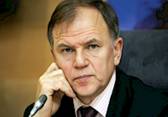
Lithuanian opposition leader
Vytenis Povilas Andriukaitis
Interview by Linas Jegelevicius
Sixty-year-old Vytenis Povilas Andriukaitis is one of the most seasoned politicians in the Lithuanian Parliament (Seimas), and one of the Lithuanian Social Democrat Party’s cornerstones. Born in Sacha, in the Far East of Russia, into a family of Lithuanian exiles, it was only in 1958, during the political thaw under the rule of the USSR leader Nikita Khrushchev, that his mother ventured to return to Lithuania, while his father was allowed to come back a year later. At secondary school Andriukaitis appeared to be a talented and keen pupil and athlete. He then entered Kaunas Medicine Institute in 1969, a big achievement for a child of exiles. In the Institute and thereafter, he got involved in anti-Soviet system activities. Detained by the KGB as a doctor, he was “exiled” again – this time 200 kilometers east, to a remote district of Ignalina. With Sajudis, the national movement for change building up, he joined the renewed party of Social Democrats and was elected its chairman during 1999-2001. Andriukaitis is a signatory of Lithuania’s Independence Act, a multi-term Seimas member and a candidate in the 1997 and 2002 presidential elections, and a vocal member of the Seimas’ Social Democrat fraction. Andriukaitis agreed to answer The Baltic Times questions.
- Bookmark :
- Digg
- del.icio.us
- Stumbleupon
- Redit it
Moscow, we have a problem in Lithuania
- Posted by - (0) Comment
![]()

Zoya Radzivilova
By Donata Motuzaite
IT’S NOT YOUR BUSINESS: Zoya Radzivilova showed her displeasure when asked about financing for her non-profit.
Why are non-profits financed by the Russkiy Mir foundation refusing to disclose their donors?
“Absolutely not,” Zoya Radzivilova replied when Re:Baltica called to ask for the names of foundations that finance her non-profit. Radzivilova is the director of the Vilnius-based youth theater group called Green Lantern. She also ran in two recent elections as a candidate for the Lithuanian Russian Union party. Radzivilova spoke fluent Lithuanian and didn’t hide her irritation with the question. The assistance she received abroad was no longer “Lithuania’s business,” she snapped back.
- Bookmark :
- Digg
- del.icio.us
- Stumbleupon
- Redit it
- Posted by - (0) Comment
Frankfurter Rundschau:
”Lukaschenko, der gnadenlose Barbar”
Lukashenko, the
ruthless barbarian
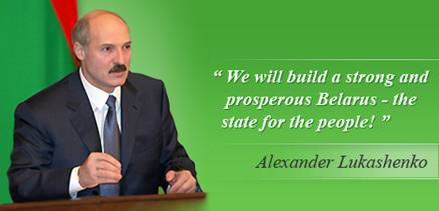
Photo/motto: http://president.gov.by/en/
German newspaper Frankfurter Rundschau calls Belarusian President Alexander Lukashenko a ruthless barbarian after the execution of two young men convicted of a bomb attack at Minsk subway’s most crowded station on April 11, 2011
"The question of whether the guilty of the convicted has been proven is not decisive. The president, who believes that the death of people can be repaid by the death of others, makes a killer of himself. Disregard for human life makes them indistinguishable,” writes the newspaper.
“In addition,” says the newspaper, “the method of the execution in Minsk - a shot in the head - is a symbol of terror in itself. For example, that was the way of killing of thousands of Stalin's victims by monstrous hangman Vasili Blokhin. The memory of this is embodied in the collective consciousness in the former Soviet space deeper than it’s portrayed in the West."

Last November, Dmitry Konovalov and Vladislav Kovalyov were convicted of a bomb attack at Minsk subway’s most crowded station on April 11, 2011, which killed 15 people and wounded hundreds of others. Last Friday they were both executed, shot in their necks.
- Bookmark :
- Digg
- del.icio.us
- Stumbleupon
- Redit it
- Posted by - (1) Comment
Frankfurter Rundschau:
”Lukaschenko, der gnadenlose Barbar”
Lukashenko, the
ruthless barbarian

Photo/motto: http://president.gov.by/en/
German newspaper Frankfurter Rundschau calls Belarusian President Alexander Lukashenko a ruthless barbarian after the execution of two young men convicted of a bomb attack at Minsk subway’s most crowded station on April 11, 2011
"The question of whether the guilty of the convicted has been proven is not decisive. The president, who believes that the death of people can be repaid by the death of others, makes a killer of himself. Disregard for human life makes them indistinguishable,” writes the newspaper.
“In addition,” says the newspaper, “the method of the execution in Minsk - a shot in the head - is a symbol of terror in itself. For example, that was the way of killing of thousands of Stalin's victims by monstrous hangman Vasili Blokhin. The memory of this is embodied in the collective consciousness in the former Soviet space deeper than it’s portrayed in the West."

Last November, Dmitry Konovalov and Vladislav Kovalyov were convicted of a bomb attack at Minsk
subway’s most crowded station on April 11, 2011, which killed 15 people and wounded hundreds of others.
Last Friday they were both executed, shot in their necks.
Frankfurter Allgemeine Zeitung goes on with the subject, saying:
"The death sentence was most likely decided just two days after the attack, when Lukashenko announced that the criminals had been detained. The president decides, not the courts. The same thing is happening in Belarus in all other aspects - the “truth” of the president is what counts. If the reality dares to deviate from this truth, there are always other people to blame and they should pay for it.
Nobody knows who is really behind the explosion in Minsk subway, as it’s been poorly investigated, and, obviously, will remain a mystery forever. One thing is clear, however; the dictatorship, not knowing the difference between the establishment of the truth in court and violence is a danger to society."
The newspaper Tageszeitung writes:
"Tamara Chikunova from Uzbekistan and Lubov Kovalevs from Belarus suffered a lot: their sons were executed by a dictatorial regime. Both have fought and continue to fight for the honour of their sons and against the death penalty. Seven years after the execution of Chikunova’s son Uzbek government abolished the death penalty. This is a success, which would have been impossible without the efforts of the mother of the executed.
In Belarus, more and more people are rejecting the death penalty. Many residents of Minsk not only commemorated the victims of terrorist attacks last week, but also demanded the abolition of the capital punishment in Belarus. It’s time for civil society to act. One should support the forces that are fighting in the country against the death penalty.
But politicians must take certain steps, too. Minister of Foreign Affairs of the Netherlands, the second largest trade partner of Belarus, after Russia, Uri Rosenthal demanded the expansion of sanctions "against Europe's last dictator" in connection with the recent executions. Let’s hope that the suggestion of Rosenthal will be supported among colleagues."
The paper Die Welt analyzes the relationship of Moscow to Minsk and sees the penalty as a slap on the ear of the West.
Russia plays a murky role in this story: it is distancing itself from the Belarus regime, which is considered “bad” but is unwilling to let Belarus drift toward the West. The fact, that Lukashenko is burning bridges with the West, is not considered a great loss in Moscow. The country is now dependent on Russian aid because of its post-Soviet mismanagement.
The West tried to make a deal - dollars and euros in exchange for democratic reforms. It all was in vain: the dictator is only concerned about his own and his minions’ well-being. The lives of his nine million countrymen are of less importance.
- Bookmark :
- Digg
- del.icio.us
- Stumbleupon
- Redit it
Lithuanian Interior Minister resigns – but does that save the ruling three-party coalition?
- Posted by - (0) Comment
![]()
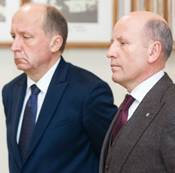
Lithuania's Interior Minister Raimundas Palaitis resigns after his heavily criticized sacking of two top officers at the Financial Crimes Investigation Service. But is that enough to save the increasingly divergent coalition government of Prime Minister Andrius Kubilius?
Lithuanian Minister of Interior Affairs Raimundas Palaitis announced on Monday that he will resign.
"I would like to say that I have no regrets whatsoever over my decision. I feel I was acting legitimately and rightly dismissing the two officers of the Financial Crime Investigation Service. But in the wake of such a difficult situation caused by actions that are hard to describe, I don't think that I should be an obstacle for Lithuania to advance, and I will shortly submit my resignation," the minister told journalists following a meeting with President Dalia Grybauskaitė and Prime Minister Andrius Kubilius.
Meanwhile the prime minister welcomed Palaitis' decision and added that it should have been made earlier.
"I welcome the minister's decision. Such a decision allows the coalition to continue common work. It would have been better if the decision had been made earlier," the head of the Lithuanian government said.
A week ago, Lithuanian President Dalia Grybauskaitė, who then refused to dismiss Palaitis, said the minister had acted according to the law.
"Taking into account the existing situation and tension between two coalition partners, when it comes specifically to Palaitis' actions, I would like to say that I did not dismiss Palaitis because, I believe, – and here we have a slight difference of opinion with the premier – he complied with all laws by dismissing the FCIS officers," the president said on Monday.
"Therefore, any compromise could have been reached only if the minister, aware of the tension in the coalition, had decided to leave this post. The minister will confirm this decision to you himself today," the president said before Palaitis announced his resignation.
- Bookmark :
- Digg
- del.icio.us
- Stumbleupon
- Redit it
- Posted by - (0) Comment
Michel Hazanavicius,
5 Oscar Prize winner,
is a French Litvak
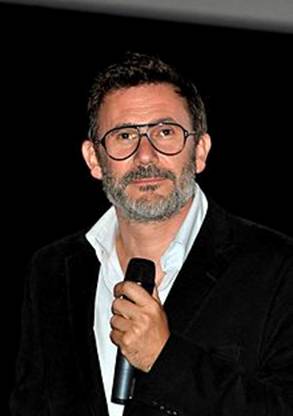
The French film maker and Director Michel HAZANAVICIUS (born in Paris, 1967), who won 5 Oscars in Los Angeles recently for his black and white sillent movie, The Artist, starring Jean Desjardins and Bérénice Bejo, is of Litvak descent.
His grand-parents emigrated from Lithuania to France in the 1920s.
- Bookmark :
- Digg
- del.icio.us
- Stumbleupon
- Redit it
Anyone ready to support us in saving the wooden houses in Vilnius and around in Lithuania?
- Posted by - (0) Comment
![]() Please write to editor@VilNews.com
Please write to editor@VilNews.com

Wooden house in the
Vilnius district of Uzupis.
See also the slide show
“Uzupis spring 2012”.
CLICK HERE to see the show.

Tatjana Grigorjeva It's a good idea!

Tatjana Grigorjeva Wooden houses like this one, is a heritage of Lithuania!

Carol Luschas Taip!

Jenn Virskus Taip!

Milda Arquer Yes ! Those houses are really among the lithuanian symbols and heritages of the past !

Jurate Kutkus Burns Absolutely! Once they are gone, they cannot be replaced.

Irene Simanavicius What do you need? how can we help? Let's get going!!! :)

Ramute Julia Zukas Yes Aage, what help can we give?

Wyman Brent I guess it is considered progress to destroy the past. What a shame.

Boris Bakunas Yes, yes, and yes again!

Warren Thompson Yes

Danguole Juska heritage...

Rasa Mekuskaite Oho, it's maybe the first time when i can see the same coluor on a house and on a fence. And this light green hue. Where is it?

Aage Myhre It's in your beloved Uzupis, Rasa :)

Rasa Mekuskaite OK:)

Jan H. Hovde Do you have a plan?

Aage Myhre Vilnius Municipality has a plan, but has not been able to implement it due to financial reasons. Also, I have to say that the public understanding of the importance of keeping and maintaining this cultural treasure is not very high. I will now try to apply for EEA/Norwegian Grants and see what can be done, and it's seriously urgent as the majority of these buildings are in very bad conditions.

Linas Johansonas Who owns these houses?

Aage Myhre Private people, families, who simply were 'installed' there during the Soviet years, then given ownership rights to their apartments after 1991. Most of the families are poor people with no means to renovate or take care of their homes, hence public support is necessary.

Tomas Chepaitis Of course, sure, we should save them - some in Zhverynas are already destroyed

Tomas Chepaitis ...but destruction comes mostly from the architectural mafia:) or municipality, isn't it so, Your Excellency Architect of the Universe?
- Bookmark :
- Digg
- del.icio.us
- Stumbleupon
- Redit it
- Posted by - (0) Comment
UŽUPIS SPRING 2012
Slide show with music. Full screeen recommended!
Photos: Aage Myhre
Director: Cassandra Myhre
Music: Music: Sergey Kuryokhin –
Morning Exercises in the Nuthouse
Užupis is a neighbourhood located in the outskirts of Vilnius' Old Town. Užupis means "on the other side of the river" in Lithuanian language and refers to the Vilnia River. The name Vilnius was derived from the Vilnia. Užupis is popular with artists, and has been compared to Montmartre in Paris due to its bohemian atmosphere. The district houses art galleries, artists' workshops, and cafés. On April Fools Day in 1997, the district declared itself an independent republic (The Republic of Užupis), replete with an army of 12 personnel. Užupis is largely characterized by dilapidated buildings, courtyards and cobblestone streets that haven‘t been renovated for decades. But when the music reverberates over the cobbles in the late evenings you will certainly fall in love with this unique part of Vilnius. The atmosphere – filled with love, music, smells and happy people – will certainly catch your soul…
- Bookmark :
- Digg
- del.icio.us
- Stumbleupon
- Redit it
Bulgarian Bella Hristova, violinist, and Lithuanian pianist Ieva Jokubaviciute again on stage together – now in Washington
- Posted by - (0) Comment
![]()

EMBASSY OF BULGARIA
1621 22ND STREET, NW
FRIDAY, MARCH 23, 2012 AT 7:30 PM- A FEW TICKETS REMAIN
BELLA HRISTOVA, VIOLIN
IEVA JOKUBAVICIUTE, PIANO
First Prize Winner in the 2008-09 Young Concert Artists International Auditions. Ms. Hristova and made her debut in the Young Concert Artists Series during the 2009-10 season at Merkin Concert Hall in New York, sponsored by the Rhoda Walker Teagle Prize, and at the Kennedy Center in Washington DC. At the Auditions, she was also awarded the Helen Armstrong Violin Fellowship, the Miriam Brody Aronson Award, the Ruth Laredo Memorial Award, the Candlelight Concert Society Concert Prize, and the Lied Center of Kansas Concert Prize. Program: Schumann, Tower, Janáček, Brahms. Very limited seating. $100/ including Bulgarian buffet dinner/wine.
- Bookmark :
- Digg
- del.icio.us
- Stumbleupon
- Redit it
- Posted by - (0) Comment
“Give us this day our
daily harbour seal”
 The harbour seal is found along temperate and Arctic marine coastlines of the Northern Hemisphere. |
 Hans Egede (1686 – 1758) was a Norwegian missionary, known as the Apostle of Greenland. |
Many of us remember our Lord’s Prayer, or Pater Noster as many call the most outstanding prayer of Christianity. One phrase goes as follows: “Give us this day our daily bread,..” This became an ever so slight nut to crack for the North Norwegian priest Hans Egede when he came to Greenland to preach in the 1700s. The indigenous people who populated the world's largest island, the Inuits, did not know what bread was!
But the priest found a solution, and in his translation to Inuit language the phrase became therefore logically enough, "Give us this day our daily harbour seal." Because it was these seals that were the most important element of the Inuit food chain at the time...
It was Hans Egede, often called the Apostle of Greenland, who founded the town of Nuuk (Godthåb), capital of today's Greenland. His statue stands solidly on its base in the outskirts of the town.
Nuuk (Godthåb), the capital of Greenland, offers colourful architecture where the winter bites as coldest
 I sit at Kastrup Airport near Copenhagen, Denmark, an early February morning. Waiting to border the Scandinavian Airlines flight to Kangerlussuaq Airport in Greenland. Then comes the message: The flight is cancelled. Luckily I get on a plane from Greenland Air, and a couple of hours later I am sitting in a red Boeing 757 heading northwest. I have been awarded a seat between two mildly said overweight Inuits, Eskimoes as we used to call them in the past. It smells of sweat and I am unable to find room for my arms on the armrests. After four and a half hour of torment we land in the icy wilderness. The temperature outsideis -40C, inside the terminal building it is a little warmer. But not much.So I'm very happy when I finally, after several hours waiting time, get on board a red propeller plane, a Dash 7, flying me to Greenland's capital Nuuk further south on the island. The trip takes only an hour.
I sit at Kastrup Airport near Copenhagen, Denmark, an early February morning. Waiting to border the Scandinavian Airlines flight to Kangerlussuaq Airport in Greenland. Then comes the message: The flight is cancelled. Luckily I get on a plane from Greenland Air, and a couple of hours later I am sitting in a red Boeing 757 heading northwest. I have been awarded a seat between two mildly said overweight Inuits, Eskimoes as we used to call them in the past. It smells of sweat and I am unable to find room for my arms on the armrests. After four and a half hour of torment we land in the icy wilderness. The temperature outsideis -40C, inside the terminal building it is a little warmer. But not much.So I'm very happy when I finally, after several hours waiting time, get on board a red propeller plane, a Dash 7, flying me to Greenland's capital Nuuk further south on the island. The trip takes only an hour.
- Bookmark :
- Digg
- del.icio.us
- Stumbleupon
- Redit it
- Posted by - (1) Comment
“Give us this day our
daily harbour seal”
 The harbour seal is found along temperate and Arctic marine coastlines of the Northern Hemisphere. |
 Hans Egede (1686 – 1758) was a Norwegian missionary, known as the Apostle of Greenland. |
Many of us remember our Lord’s Prayer, or Pater Noster as many call the most outstanding prayer of Christianity. One phrase goes as follows: “Give us this day our daily bread,..” This became an ever so slight nut to crack for the North Norwegian priest Hans Egede when he came to Greenland to preach in the 1700s. The indigenous people who populated the world's largest island, the Inuits, did not know what bread was!
But the priest found a solution, and in his translation to Inuit language the phrase became therefore logically enough, "Give us this day our daily harbour seal." Because it was these seals that were the most important element of the Inuit food chain at the time...
It was Hans Egede, often called the Apostle of Greenland, who founded the town of Nuuk (Godthåb), capital of today's Greenland. His statue stands solidly on its base in the outskirts of the town.
Nuuk (Godthåb), the capital of Greenland, offers colourful architecture where the winter bites as coldest
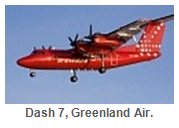 I sit at Kastrup Airport near Copenhagen, Denmark, an early February morning. Waiting to border the Scandinavian Airlines flight to Kangerlussuaq Airport in Greenland. Then comes the message: The flight is cancelled. Luckily I get on a plane from Greenland Air, and a couple of hours later I am sitting in a red Boeing 757 heading northwest. I have been awarded a seat between two mildly said overweight Inuits, Eskimoes as we used to call them in the past. It smells of sweat and I am unable to find room for my arms on the armrests. After four and a half hour of torment we land in the icy wilderness. The temperature outsideis -40C, inside the terminal building it is a little warmer. But not much.So I'm very happy when I finally, after several hours waiting time, get on board a red propeller plane, a Dash 7, flying me to Greenland's capital Nuuk further south on the island. The trip takes only an hour.
I sit at Kastrup Airport near Copenhagen, Denmark, an early February morning. Waiting to border the Scandinavian Airlines flight to Kangerlussuaq Airport in Greenland. Then comes the message: The flight is cancelled. Luckily I get on a plane from Greenland Air, and a couple of hours later I am sitting in a red Boeing 757 heading northwest. I have been awarded a seat between two mildly said overweight Inuits, Eskimoes as we used to call them in the past. It smells of sweat and I am unable to find room for my arms on the armrests. After four and a half hour of torment we land in the icy wilderness. The temperature outsideis -40C, inside the terminal building it is a little warmer. But not much.So I'm very happy when I finally, after several hours waiting time, get on board a red propeller plane, a Dash 7, flying me to Greenland's capital Nuuk further south on the island. The trip takes only an hour.
 I have come to Nuuk to monitor the construction of town-houses I had designed during the previous year from my architect office in Vilnius. I could hardly believe my ears when, a few months ago, I was told that the colours we should use was bright yellow, turquoise, pink and purple. All in pastel tones.
I have come to Nuuk to monitor the construction of town-houses I had designed during the previous year from my architect office in Vilnius. I could hardly believe my ears when, a few months ago, I was told that the colours we should use was bright yellow, turquoise, pink and purple. All in pastel tones.
Now I stand here in the bitter winter cold, watching the walls, manufactured in Lithuania, being lifted into place. I see that many of the houses around are also unusually colourful. Perhaps it is so that the colours give a little warmth in the otherwise barren, windswept winter landscape. Or is colour perception different for Inuits and other indigenous peoples than for us 'younger' versions of the human race?
The town of Nuuk is barely 300 years old, but this area has a long history of settlement, first occupied by the old pre-Inuits, the Paleo-Eskimos. Their Saqqaq culture dates as far back as 2200 BC when they lived in the area around a now abandoned settlement called Qoornoq. Over time the area was occupied by the so-called Dorset culture, which, however, disappeared from the Nuuk district, even before year 1000. The Norwegian Viking Erik the Red founded the first European settlements here, at the end of the 900s.The area was after that inhabited by the Vikings through a few hundred years. Inuits and Norwegians lived side by side until around 1500 when the Norse settlements ceased, probably due to changes in climate. It was also here the Viking ships sailed further west and came to Nova Scotia in today's America in the year 1000.
The Viking who led his armada of Viking ships to America was Leif Ericson. He came from a long line of explorers, and unfortunately murderers as well. Leif's great-great-great uncle, Nadod, discovered Iceland in about 861, and Leif's father, Erik Thorvaldson, otherwise known as Erik the Red, discovered Greenland around 970-980. After his father died, Erik moved to a different area of Iceland and got married. The next two incidents shaped the future. Erik himself was exiled and outlawed twice; the first time because his slaves caused a landslide that ruined a man's property. The second time, Erik attempted to get a family heirloom back, he and the men supporting this act, were attacked, and ended up murdering the man's sons and several of his supporters. So once again Erik was outlawed. Erik decided to venture out and explore during his three years of exile. It was during this time, about 970 A.D. that Leif was born to Erik the Red.
Leif's voyage to America was planned and had a forceful, brave, shrewd leader who was careful in all things. His discovery, then, was not an accident, as those who give too little credence to Viking navigational skills intimate. He set sail probably in 995, passed Markland (Labrador), and reached Newfoundland, where his thirsty crewmen drank dew from the grass. Here, in what probably was Leif's Vinland, the men decided to winter, noticing that the days were more equitable in length than at home in Greenland.
In addition to building lodgings, the men cut timber and hunted. Their tasks were eased by the fact that there were no natives in the vicinity. On one hunting and exploratory expedition, one Turk, who had lived in warmer climates, returned with grapes. Consequently the men began to cut vines and harvest grapes in addition to gathering timber. Because of the new find, Leif named the area Vinland, which subsequently became known as Vinland the Good. Where in Newfoundland Leif wintered is still a matter of controversy, but most leading scholars are firmly convinced that it was on that island. Grapes grew wild in quantity in Newfoundland until as late as the middle of the 17th century, because the climate then was much more benign than it is today.
This has been the story of a missionary who had to find a re-phrasing of the Lord's Prayer. It has also
been about a totally different colour understanding than what we are accustomed to, and it has been about Norwegian Vikings who more than 1000 years ago came to America, 500 years before Columbus 'discovered' the vast continent on the other side of the Atlantic Ocean.
Creativity, discovery urge, ability to survive and thrive even in harsh environments. This is what we can
learn from these people.
And in the midst of it all there are some colourful Lithuanian houses...
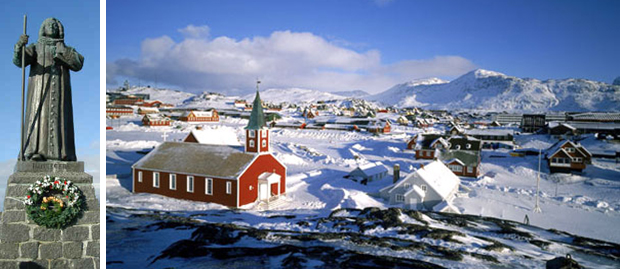
It was Hans Egede (1686-1758) who founded the town of Nuuk, Greenland's capital. But this is not exactly an overcrowded part of our world, so the population of the capital is still only around 15,000.
Photo: Cirrusnetwork.net
Aage Myhre, Editor-in-Chief
aage.myhre@VilNews.com
- Bookmark :
- Digg
- del.icio.us
- Stumbleupon
- Redit it
![]()

Vilnius University has implemented a new virtualization lab that lets students understand cloud resources by provisioning their own. Vilnius University chose Abiquo from a company of the same name, to outfit the new lab, which is part of the school's Digital Science and Computing Center, built by the department of Mathematics and Informatics. Vilnius U, founded in the 16th century, has about 23,000 students.
The lab set-up is intended to allow students to provision virtual resources across multiple technologies without pulling in university IT staff to help.
- Bookmark :
- Digg
- del.icio.us
- Stumbleupon
- Redit it
The United States calls for Russia to probe reported fraud in the presidential election
- Posted by - (0) Comment
![]()
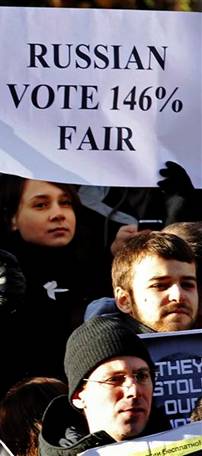
The United States last week called for Russia to probe reported election fraud as the West warily marked Vladimir Putin's return to the Kremlin amid congratulations from Asia and the Balkans.
Washington hoped Moscow would carry out an "independent, credible" investigation, said US State Department spokeswoman Victoria Nuland, after foreign monitors found the results had been skewed in Putin's favor.
Putin secured almost 64 percent of the vote in the election, winning back the Russian presidency he held for two terms from 2000-2008 before he took a four-year stint as prime minister.
But international observers led by the Organization for Security and Cooperation in Europe OSCE) said while there had been progress in transparency, the campaign had been massively tilted in favor of Putin.
"Conditions (for the campaign) were clearly skewed in favor of... Vladimir Putin" while the vote count was "assessed negatively in almost one-third of polling stations observed due to procedural irregularities," they said.
Hundreds protested Putin's comeback on the streets of Moscow after the election, some shouting out "disgrace," with police moving in to disperse the demonstrations and arresting dozens.
Nuland said Washington endorses the preliminary report by the OSCE and the Parliamentary Assembly of the Council of Europe (PACE).
And she added, without mentioning Putin by name, that the United States "looks forward to working with the president-elect after the results are certified and he is sworn in."
- Bookmark :
- Digg
- del.icio.us
- Stumbleupon
- Redit it
VilNews e-magazine is published in Vilnius, Lithuania. Editor-in-Chief: Mr. Aage Myhre. Inquires to the editors: editor@VilNews.com.
Code of Ethics: See Section 2 – about VilNews. VilNews is not responsible for content on external links/web pages.
HOW TO ADVERTISE IN VILNEWS.
All content is copyrighted © 2011. UAB ‘VilNews’.

 Click on the buttons to open and read each of VilNews' 18 sub-sections
Click on the buttons to open and read each of VilNews' 18 sub-sections 

















.jpg)



